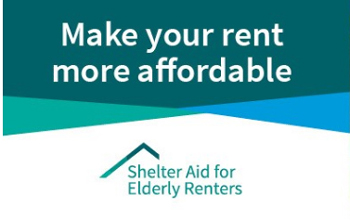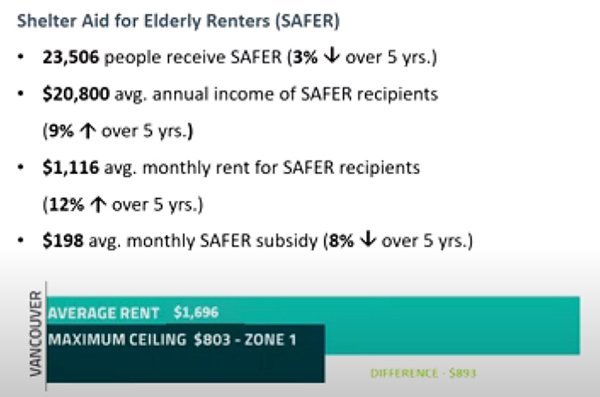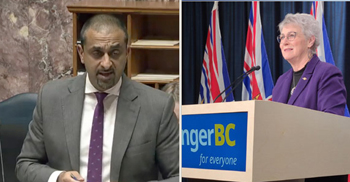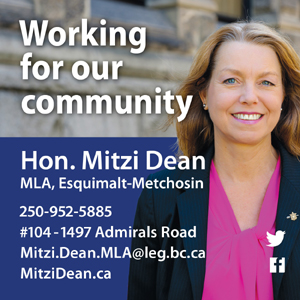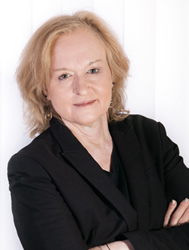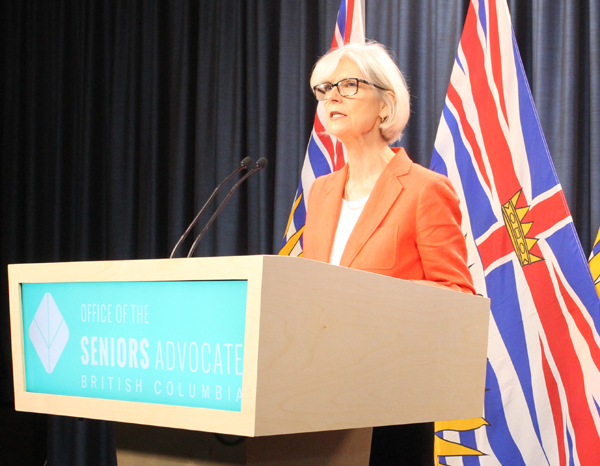
Sunday March 17, 2024 | VICTORIA, BC
by Mary P Brooke | Island Social Trends
Seniors in British Columbia pay rent in the same marketplace as anyone else who rents a home.
Unless they are in subsidized or designated affordable housing or they are residents of long-term care or assisted living.
But as the aging population — much of whom are staying healthier longer — are living independently in communities, older BC residents are facing the same rental increase and availability challenges as other renters.
BC’s SAFER program:
The Shelter Aid for Elderly Renters (SAFER) program has been available to BC seniors over age 60 for several years now.
BC Housing describes SAFER as “helping make rents affordable for BC seniors with low to moderate incomes”.
SAFER provides monthly cash payments to subsidize rents for eligible BC residents age 60+. Existing clients need to reapply each year.
Rising cost of living amidst rental crunch:
Rent levels and also the cost of living have been continually increasing, including since the last SAFER review in 2018.
Those pressures have been particularly strident since the impacts of the pandemic and housing crisis (overall rapid population increase but insufficient housing supply) through 2021 to present.
Aging population:
The oldest baby-boomers are turning 78 years old this year. That means many more seniors are coming up into the system over the next 10 years for needing a range of seniors supports, including SAFER.
Governments and the public seem to be just starting to realize the magnitude of this shift.
Perhaps the disconnect around supporting seniors in the rental market has to do with still thinking that ‘seniors’ are infirm persons who are non-participatory in the overall economy and community.
Many seniors over age 60 are still working largely because the cost of living commands it. And thanks to an overall attitude of healthy living, many older people are active and healthy well into their 70s and even their early 80s.
Seniors Advocate weighs-in on SAFER once again:
In responding to media questions about her final report as BC Seniors Advocate Isobel Mackenzie, on March 14 she again articulated how far behind the BC Housing Shelter Aid for Elderly Renters (SAFER) program is.
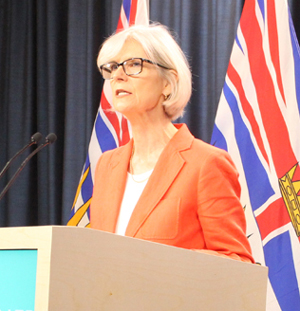
“The biggest issue that seniors are facing and exponentially more so for seniors that rent — is the affordability issue,” said Mackenzie.
She outlined that the income of seniors is 65% lower than people in the active working population. “The apartment they want to rent is in the same rental market. There’s not a senior’s rate for renting. They are having a very very difficult time. Then if you’re looking at seniors who need home support services, BC charges for its home support services. It’s very costly; 70% of seniors have to pay for it — if you’re on GIS you don’t.”
Mackenzie said that both the government and the public need to recognize this shift.
“I don’t know why it’s taken so long,” said Mackenzie about the stubborn lag in SAFER program parameters in serving the real needs of low-income seniors who rent. “That’s a question the Minister would have to answer,” she said.
When you look at what the rents are and you know at these incredibly low incomes, returning to this role of 30% of income — which was the original idea behind the program. When you look at the rent ceilings I think you have to do two things: they have to be raised significantly — at a minimum they should be raised to meet the average rent of a SAFER recipient (that’s already below market rent),” said Mackenzie.
And then, rents in this province go up every year by the allowable rent increase. And that should be built in, and the ceiling should go up each year to reflect that.
A senior who has to move from a rent-controlled accommodation to the open rental market that’s “catastrophic”, said Mackenzie in her March 14 media session. “They can’t begin to find a place to rent” at the level of an average SAFER recipient, she explained.
“We’re starting to see the effect of that,” which Mackenzie says includes premature admissions to long-term care or some staying in hospital a bit longer. Both of those are highly costly to the health-care system.
Seniors subsidized housing you have to build. “That’s complicated” to find the land and build. By comparison, adjusting the SAFER calculation process can be done easily and the process is already in place. Fixing SAFER “could be done overnight”, said Mackenzie.
Political response:
Both Finance Minister Katrine Conroy and Housing Minister Ravi Kahlon have said in recent weeks that a review of the program was done in 2022, with a report provided to government in 2023, with findings currently being reviewed.
In a comment to media on March 14, BC Greens Leader Sonia Furstenau described the lack of responsiveness of the BC Government regarding the SAFER program as “very strange and unsupportable”, and that government has “not solved the problem with SAFER to ensure that we’re keeping seniors housed in this province”.
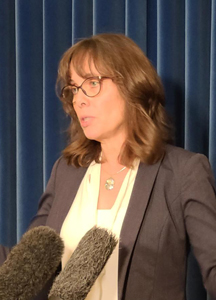
She said that the BC Greens “have been asking this government to address the gaps in SAFER for years now (bringing it forward in Estimates, in letters, in Question Period)
“It is a simple fix that they could do. They could raise the rates and stop the clawbacks on SAFER,” said Furstenau, adding: “The cost of that is significantly less than the cost of what we’re seeing in our communities right now which is people in their ’70s finding themselves homeless.”
She described a scenario of some seniors “living in their vehicles, being discharged from hospital to a car because they have nowhere to live.”
Problems with the SAFER mechanism:
Intended to support low income seniors who rent, SAFER calculates support for applicants with a rent ceiling of $803.
As well, many of these low-income seniors receive income from the Canada Pension Plan (CPP), Old Age Security (OAS), and Guaranteed Income Supplement (GIS); all of those programs have increased the amounts paid out to seniors in recent years — toward helping seniors keep up with the cost of living — but which for the SAFER calculation sees as ‘higher income’ which simply widens the qualification gap.
As a result of these two key factors, most seniors on the SAFER program have been receiving less and less support each year since 2019.
Fixes for the SAFER mechanism:
Assuming that the spirit of the SAFER program remains intact, i.e. to support low-income seniors who require support with rent, there are two key fixes required for the SAFER program calculations, in order to achieve more affordability for seniors:
The rent ceiling needs to be increased to realistically reflect current rent levels in the open market, or even more specifically to reflect 30% of the average SAFER recipient’s income.
Perhaps when the SAFER program began most recipients were living in designated affordable housing units as well as in long-term care and assisted living. But as more seniors live independently in community longer, those older folks are competing for rentals head-on in the open market for apartments, townhomes and houses for rent.
According to Rentals.ca, the asking rent for all residential property types in Canada averaged $2,193 in February, increasing 10.5% year-over-year — the fastest rate of annual growth since September 2023. Anything larger than a small apartment (e.g. townhouse or house with yard) clearly rents for much higher than that.
The Province’s 3.5% yearly rent increase as can be charged to renters by landlords in the open rental market should also be automatically recognized in the SAFER calculation; i.e. it can be assumed that anyone renting in the open rental market (including seniors) will be charged as much as 3.5% more each year; SAFER applicants are asked to declare how much they pay for rent, so the increase is easily seen.
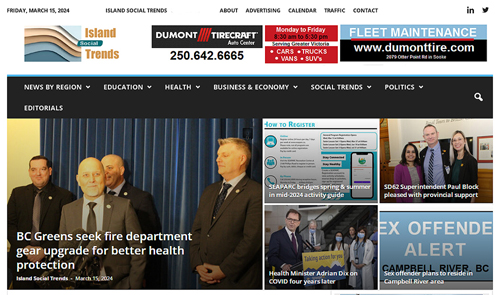
===== RELATED:
- Rethink and embrace aging says new BC Seniors Advocate (January 26, 2024)
- BC Seniors Advocate: a billion more reasons to care (September 25, 2023)
- Adjusting the financial realities for seniors takes insight and commitment (August 15, 2023)
- Expanded supports for seniors living independently (May 9, 2023)
===== ABOUT THE WRITER:
Island Social Trends Editor Mary P Brooke reports regional and BC news through a socioeconomic lens. She is the founder of Island Social Trends (daily news and analysis, 2020 to present) and before that the west shore regional publication series of West Shore Voice News (2014-2020), Sooke Voice News (2011-2013), and MapleLine Magazine (2008-2010).
After reporting on the COVID pandemic daily during 20202-2021 and into 2022, Ms Brooke started reporting with the BC Legislative Press Gallery.
Ms Brooke holds a B.Sc. in health science.
===== ISLAND SOCIAL TRENDS – How to be a digital subscriber =====
Bookmark the IslandSocialTrends.ca news portal and be a part of ongoing support for independent journalism! Don’t miss this analysis of local, regional and provincial news — add IslandSocialTrends.ca to your bookmarks (phone and desktop). Visiting the news portal is always free.
Help us keep the lights on! You can also support this Vancouver Island journalism by becoming a digital subscriber. For just $7.25+GST per month, you will receive by email the PDF of our biweekly print edition.
Support journalism that serves your community, by subscribing today.



